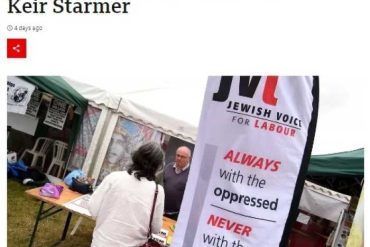1) NGO Monitor provides a backgrounder on the NGOs that campaigned to persuade Ben & Jerry’s to boycott Israel.
“This announcement and change in policy is part of a broader NGO-led BDS (boycott, divestment, sanctions) agenda and follows 10 years of campaigning from pro-BDS NGOs, predominantly led by an otherwise insignificant group, Vermonters for a Just Peace in Palestine/Israel, as well as US Campaign for Palestinian Rights and Jewish Voice for Peace. Calls on Ben & Jerry’s to boycott Israel significantly increased during the May 2021 Israel-Gaza conflict, when pro-Palestinian activists swarmed the comments sections of Ben & Jerry’s social media accounts, demanding the company boycott Israel and resulting in Ben & Jerry’s halting its social media activity for two months.”
2) The ITIC reports on a recent conference in Ramallah that was sponsored by PA president Mahmoud Abbas.
“PA Prime Minister Muhammad Shtayyeh gave a speech at the conference reiterating the Palestinian claim that no connections exist between the Hebrews, the Israelis and the Jews, and today’s Jews are actually Khazars, a Turkic-speaking tribe which converted to Judaism only in the 6th century CE. Shtayyeh added that Israel is not a state but rather a “tool” put in place to protect foreign interests. Other speakers reiterated the same points, stressing the claim that the Jews had no links to Jerusalem.”
3) At the INSS Sima Shine analyses ‘The Nuclear Talks in Vienna: Iran’s Procrastination’.
“Iran is not in a hurry to return to the nuclear talks with the United States and will not return to negotiations before President-elect Ebrahim Raisi takes office. In the meantime, Tehran is accumulating important knowledge and experience for a decision to progress toward nuclear weapons, and in the international arena there is increasing doubt regarding the chance of renewing the nuclear deal. Under the auspices of the dialogue underway in Vienna, Iran is progressing on uranium enrichment to high levels, uranium metal production, and the operation of advanced centrifuges.”
4) At WINEP Matthew Levitt analyses ‘The Role of the Islamic State in the Assad Regime’s Strategy for Survival’.
“It may seem contrary to conventional wisdom, but the regime of Bashar al-Assad has consistently supported the Islamic State terrorist group (ISIS) even as the regime struggles to retake control of Syrian territory from the various rebel groups engaged in the Syria civil war, including ISIS. ISIS has been fighting in Syria since its precursor organization sent operatives into the country from Iraq in 2011. But the Syrian regime of Bashar al-Assad took the strategic decision to enable and facilitate the continued survival of the Islamic State in Syria in an effort to paint all of the Syrian opposition as “terrorists.” The Syrian government’s support included both passive support, such as deciding not to target ISIS positions, and active support, such as releasing terrorists from Syrian prisons and helping to bankroll ISIS by purchasing oil from ISIS and wheat from ISIS-controlled areas that ISIS was able to tax. In fact, Syrian government support for the terrorist network that morphed into ISIS goes back many years, to include support for foreign fighters traveling through Syria to join al Qaeda in Iraq (AQI, later the Islamic State in Iraq, ISI), making it the group’s earliest and most significant state sponsor.”





